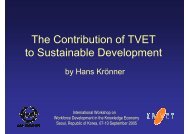Learning for Life, Work and the Future Initial ... - Unesco-Unevoc
Learning for Life, Work and the Future Initial ... - Unesco-Unevoc
Learning for Life, Work and the Future Initial ... - Unesco-Unevoc
Create successful ePaper yourself
Turn your PDF publications into a flip-book with our unique Google optimized e-Paper software.
Page 60 Participants’ Papers <strong>Learning</strong> <strong>for</strong> <strong>Life</strong>, <strong>Work</strong> <strong>and</strong> <strong>the</strong> <strong>Future</strong><br />
per<strong>for</strong>med well enough to retain <strong>the</strong>ir jobs, <strong>and</strong> that<br />
those who secured jobs with government departments,<br />
councils <strong>and</strong> parastatals also per<strong>for</strong>med well, with<br />
some given positions of responsibility.<br />
The study went on to state that Training with Production<br />
makes Brigades graduates strong per<strong>for</strong>mers in<br />
practical work. It however noted that <strong>the</strong> extent to<br />
which practicals are undertaken in <strong>the</strong> Brigades<br />
depends on <strong>the</strong> strength of <strong>the</strong> production wing of a<br />
particular training institution. It was found that if<br />
production units are strong, trainees will have an<br />
enhanced opportunity <strong>for</strong> practical training.<br />
The above example dispels <strong>the</strong> notion that Brigades<br />
produce poor quality graduates. Brigades have adapted<br />
to <strong>the</strong> current needs of <strong>the</strong> learning population even<br />
though <strong>the</strong>y continue to pride <strong>the</strong>mselves in promoting<br />
<strong>the</strong> concept of Training with Production.<br />
The rise in entry requirement from Primary School<br />
Leaving Certificate to Junior Certificate <strong>and</strong> above has<br />
enabled <strong>the</strong> quality of Brigades training to improve,<br />
with more “advanced” <strong>the</strong>ory being offered. The<br />
Brigades now use <strong>the</strong> same syllabi in all <strong>the</strong>ir programmes<br />
as do <strong>for</strong>mer VTCs, <strong>and</strong> <strong>the</strong>y take <strong>the</strong> same<br />
examination administered by Madirelo Training <strong>and</strong><br />
Testing Centre (MTTC). The Brigades workshops are<br />
well equipped with modern facilities to enable trainees<br />
to acquaint <strong>the</strong>mselves with <strong>the</strong> technology currently in<br />
use by industry. The availability of computers in some<br />
Brigades has enhanced <strong>the</strong> trainees’ knowledge of<br />
in<strong>for</strong>mation technology by exposing <strong>the</strong>m to <strong>the</strong> most<br />
recent computer applications such as Windows 98, MS<br />
Office <strong>and</strong> o<strong>the</strong>rs.<br />
The majority of Brigades still offer Trade “C” <strong>and</strong> “B”<br />
certificate level courses, but <strong>the</strong>re is a positive trend<br />
towards higher qualifications. Tswelelopele Centre,<br />
which in <strong>the</strong> past was <strong>the</strong> only Brigade offering<br />
training in Architectural Draughting up to National<br />
Craft Certificate (NCC), maintained a high pass rate,<br />
hence <strong>the</strong> government decision to add more NCC<br />
courses in o<strong>the</strong>r Brigades. Under NDP 8, <strong>the</strong> government<br />
has upgraded three Brigades to offer courses up<br />
to NCC. Four o<strong>the</strong>rs will be added at a later phase.<br />
The private sector <strong>and</strong> government easily absorb <strong>the</strong><br />
graduates of <strong>the</strong> Architectural Draughting courses as<br />
technicians. Some of <strong>the</strong> successful ones have<br />
upgraded <strong>the</strong>mselves through government sponsorships<br />
to acquire diploma <strong>and</strong> degree qualifications in ei<strong>the</strong>r<br />
Architectural Draughting or Civil Engineering.<br />
The cited example demonstrates <strong>the</strong> extent to which<br />
Brigades graduates compete favourably in <strong>the</strong> job<br />
market <strong>and</strong> <strong>the</strong>re<strong>for</strong>e indicates <strong>the</strong> acceptability of <strong>the</strong>ir<br />
training. The Tracer <strong>and</strong> Evaluation Study also<br />
revealed that as far as workmanship is concerned,<br />
Brigades graduates are just as good as any artisans in<br />
<strong>the</strong> market. It was established that, on account of <strong>the</strong><br />
nature of <strong>the</strong>ir training, <strong>the</strong>y were rated <strong>the</strong> best in<br />
terms of work attitude.<br />
With government support, Brigades are sending <strong>the</strong>ir<br />
instructors <strong>for</strong> courses offered by <strong>the</strong> University of<br />
Botswana <strong>and</strong> to Technicons in South Africa to study<br />
<strong>for</strong> diplomas in <strong>the</strong>ir respective specialisations. About<br />
90% of instructors are now holders of NCC qualifications<br />
<strong>and</strong> some are improving <strong>the</strong>ir academic qualifications<br />
through private study. Brigades continue to<br />
diversify from offering mainly construction vocations<br />
into areas such as business studies, auto engineering,<br />
<strong>and</strong> electrical engineering.<br />
Batswana should begin to realise that <strong>the</strong> way <strong>for</strong>ward<br />
<strong>for</strong> most of our youths is to enrol <strong>for</strong> artisan training,<br />
<strong>and</strong> <strong>the</strong> Brigades are <strong>the</strong> most experienced institutions<br />
in this area. The Revised National Policy on Education<br />
(RNPE) of 1994 encourages among o<strong>the</strong>r things <strong>the</strong><br />
effective preparation of students <strong>for</strong> life, citizenship,<br />
<strong>and</strong> <strong>the</strong> world of work, <strong>and</strong> <strong>the</strong> improvement <strong>and</strong><br />
maintenance of quality of <strong>the</strong> education system. It is<br />
now evident to most parents that <strong>the</strong>re are limited<br />
vacancies in our tertiary institutions. This situation<br />
leaves most youths with nowhere to go but to roam <strong>the</strong><br />
streets. Joining technical skills training should be<br />
considered a viable option, especially since <strong>the</strong><br />
government is promoting such diversification in our<br />
learning approach.<br />
The current system allows youths who have completed<br />
certain courses to upgrade at a later stage to acquire<br />
diploma <strong>and</strong> degree qualifications, even after going<br />
through Brigades training.<br />
The way <strong>for</strong>ward in <strong>the</strong> 21 st century is through learning<br />
<strong>for</strong> life, work <strong>and</strong> <strong>the</strong> future. The sou<strong>the</strong>rn African<br />
region should establish a network of technical <strong>and</strong><br />
vocational education <strong>and</strong> training institutions to<br />
facilitate <strong>the</strong> flow of in<strong>for</strong>mation on educational<br />
matters. There should be an exchange of views about<br />
how to work towards <strong>the</strong> continuous improvement of<br />
technical <strong>and</strong> vocational training. Trainees should<br />
have access to higher institutions of learning, ei<strong>the</strong>r<br />
through full-time programmes or through distance<br />
learning. Local institutions should allow such aspiring<br />
trainees to use <strong>the</strong>ir facilities <strong>for</strong> both study <strong>and</strong><br />
practical training.





